It was not until I went on a field trip to the traditional lands of the Auyu People (also written as Awyu in the Indonesian language) last June that I appreciated just how remote many of their settlements are, deep in the territory known internationally as West Papua, just across from the border with Papua New Guinea. The village I visited, Yare, is located in Boven Digoel district, part of the newly formed province of South Papua. It was a seven-hour trip from the district capital Tanah Merah to Yare by longboat, motorcycle, and motorised canoe known as ketinting.
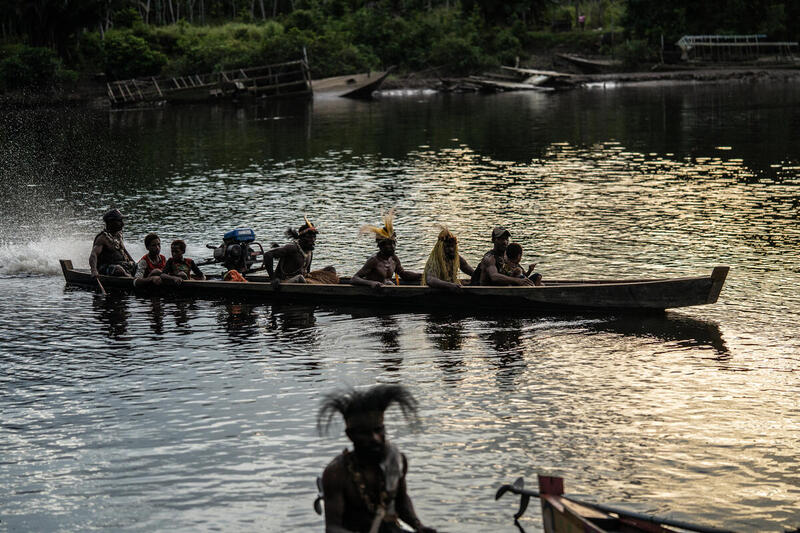
The village is located in a richly forested area that is under threat from plantation industry land grabbing and deforestation. With support from Greenpeace Indonesia, Pusaka Bentala Rakyat Foundation, Papua Legal Aid Institute, and other NGOs, members of the Auyu have launched several legal actions to defend their customary forest from companies seeking to clear the land for plantations. Along with four other colleagues from Greenpeace Indonesia, I was on a field trip to witness and document the lives of the Auyu and their relationship with the land that they inhabit.
The Journey
We set off from the port town of Tanah Merah on the Digoel River, one of the world’s last great free-running ‘wild’ tropical rivers, that winds unimpeded 853 kilometres southwards from Papua’s mountainous spine down to the Arafura sea with the northern tip of Australia a stone’s throw away. Boarding a longboat, we rode downstream for the best part of an hour until we reached Ampera, where we took a turn into a tributary before stopping at the riverbank.
Then, surprisingly, came the hardest part of the journey: a two-hour motorcycle ride to cross overland from the Digoel to the Mappi River at Fofi. For most of the 42-kilometre route our bikes lurched and slid across the muddy red dirt road. Thankfully, it had only drizzled that day – if there had been one of the area’s frequent downpours, the ride would have been even less of a picnic.
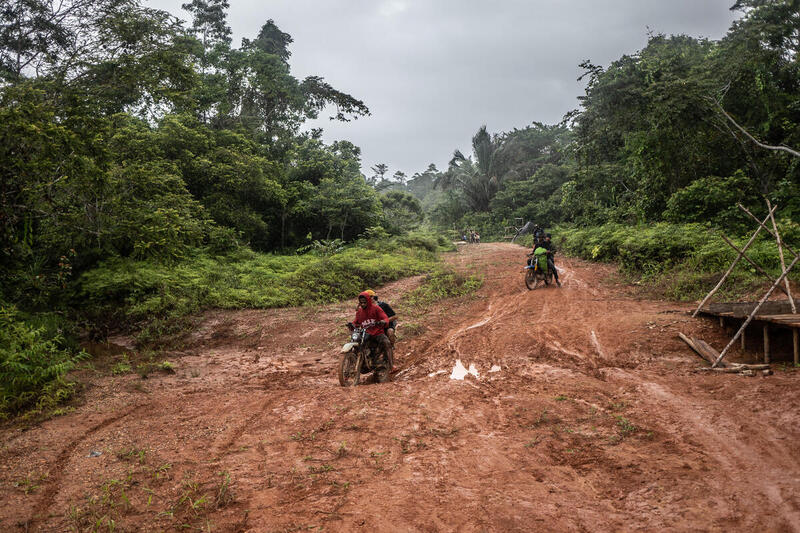
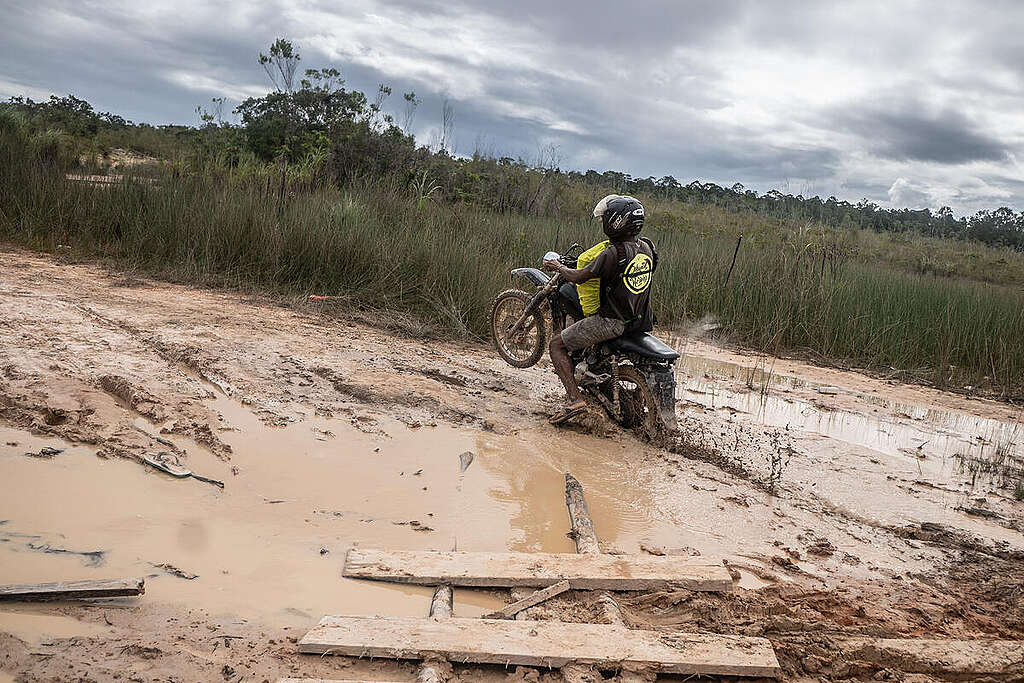
We reached Fofi in the afternoon, from where we motored in small ketinting down the Mappi River to our final destination at Yare Village. The hour and a half aboard the canoe gave me an eerie feeling. Perhaps it was because of the denseness of the surrounding forest dwarfing the ketinting and creating echoes of its engine sounds. We were told by Hendrikus ‘Franky’ Woro, environmental defender and leader of the Woro clan of the Auyu people, that crocodiles roam the river. Fortunately, none of them made themselves known during our trip.
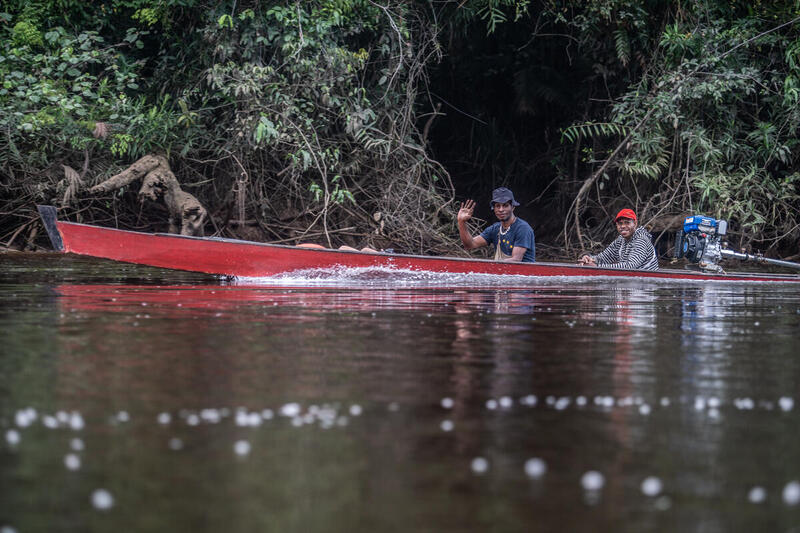
A Village Greeting
It was almost dusk when we arrived at Yare village. To our surprise, the Auyu from two nearby villages were also gathered there. Brandishing shields and bows, men and women with traditional body paint and bird of paradise headdresses greeted us with their customary welcoming dance.
As the Auyu women sang we could discern “a team from Jakarta” in the lyrics. We found out later that the song was created for the occasion of our visit by Veronika Sifi, an Auyu woman. The song mentioned our visit, all the way from Jakarta, to help them defend their land. It was a lovely song but laced with sorrow as it highlighted the threats hanging over their lands.
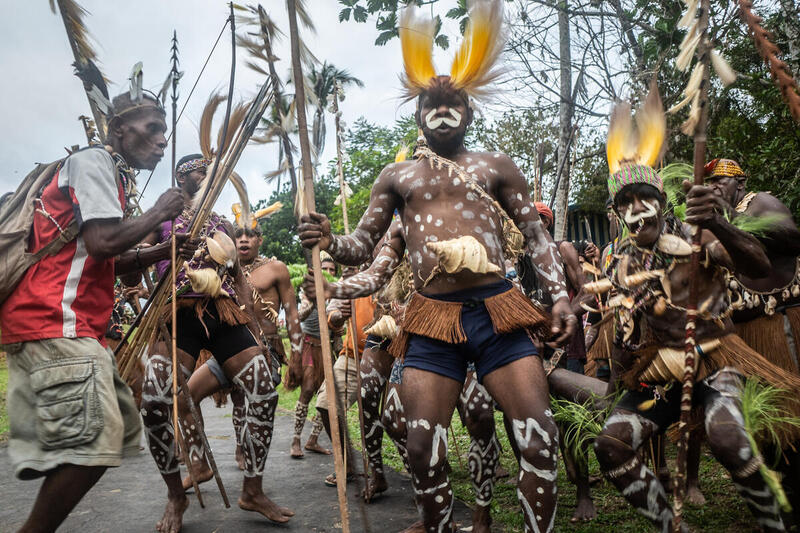
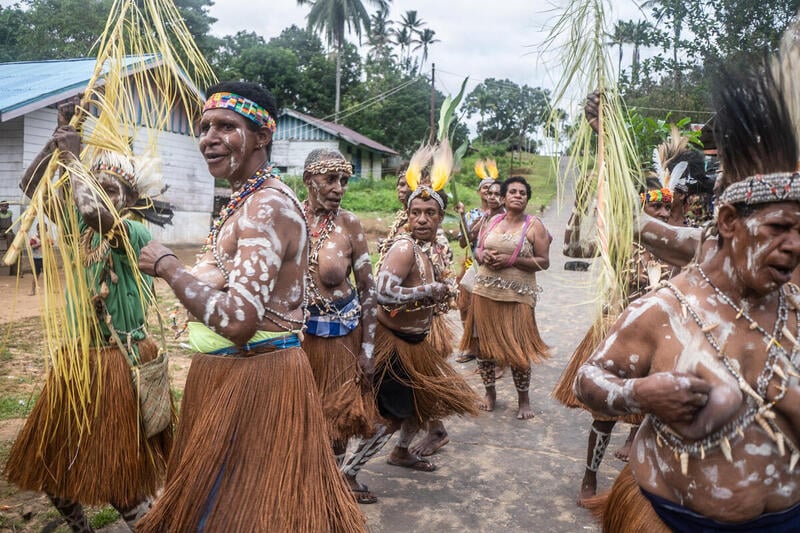
We stayed in Yare village for five days, witnessing and documenting the life of the Indigenous Auyu and how dependent they are on their lands, forests, rivers, swamps, and other natural resources for their livelihood. We joined Auyu women to collect and process sago–the staple food for most lowland Papuan communities.
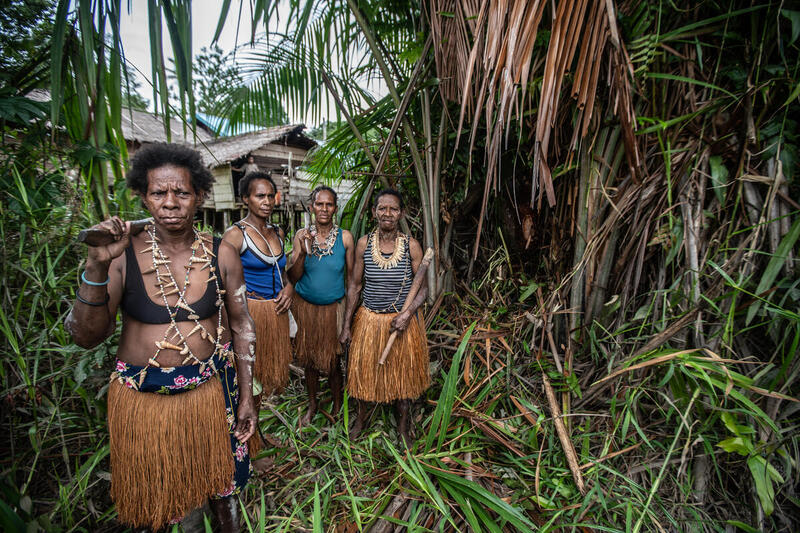
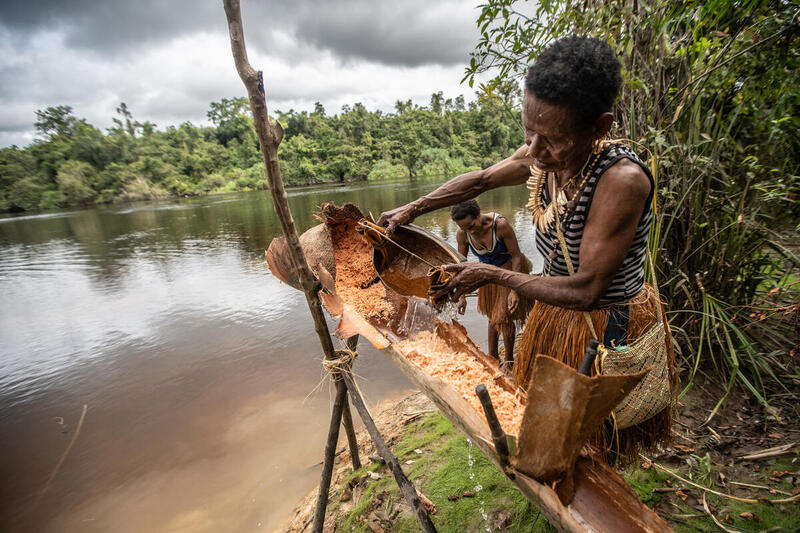
To the Auyu, the forest is an ‘eternal bank account’. Food, medicine, traditional clothing to building materials, the forest provides everything and is therefore entwined with the Auyu’s cultural identity.
Besides rainforests, rivers and wetlands also play important roles in the traditional economy of the Auyu people. While wells are unfamiliar there, the Auyu take water from rivers or wetlands for cooking, drinking, and showering. They say they do not need to boil water collected from the nearby rivers, and can drink it safely straight away.
On the third day of our visit, we followed the Auyu deep into their customary forest area that has fallen under the shadow of a government-issued concession for clearance to make way for an industrial palm oil plantation. The people of Yare village are not unique in this plight – many Indigenous lands in Papua are now under threat from the industry, with almost a million hectares of forest land released for plantations since 2000, according to Greenpeace International’s report License to Clear: The Dark Side of Permitting in West Papua.
It was a three-hour trek through the pristine rainforest, rich in biodiversity. As we walked, our Auyu friends explained the versatility of the trees that we encountered along the way in their daily lives.
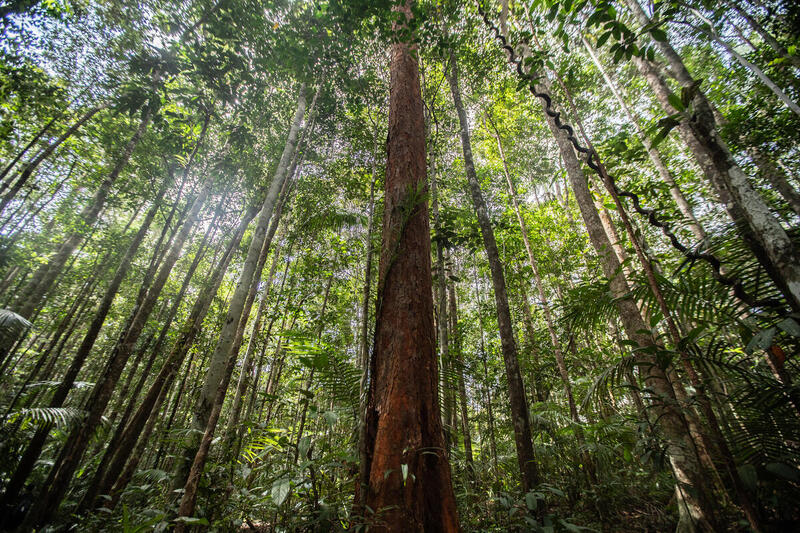
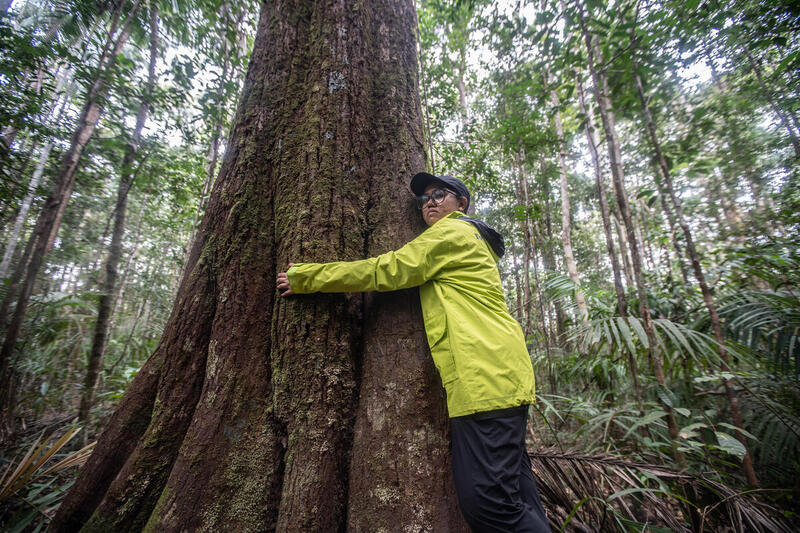
Take for example the Nibung tree. Its frond spines can be woven into mats, its trunks make up the floors of Auyu houses and the bark is used as cough medicine. The leaves are usually used for lining bivouacs and wrapping up sago. The shoots are edible as vegetables or processed to be Papuan salt. The peeled shoots can be eaten right away as snacks. I tried some – it tasted sweet like good coconut meat.
We came home with a piglet that the Auyu had caught while they were hunting during the trek.
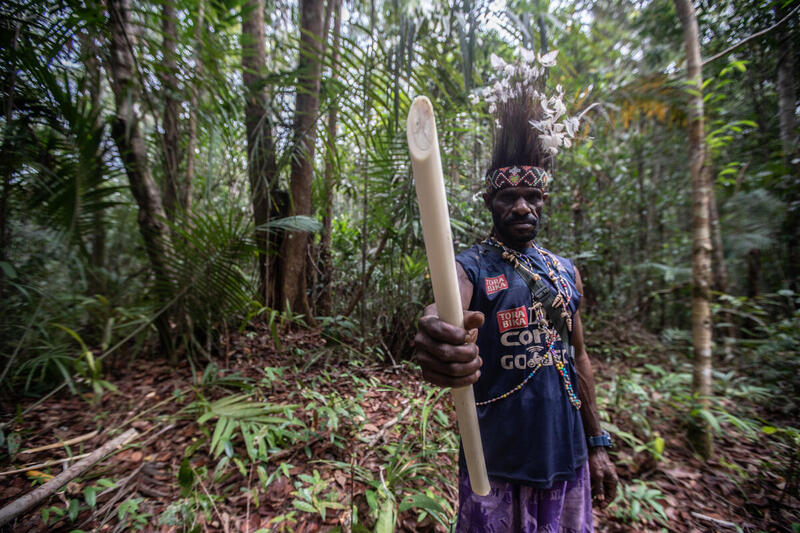
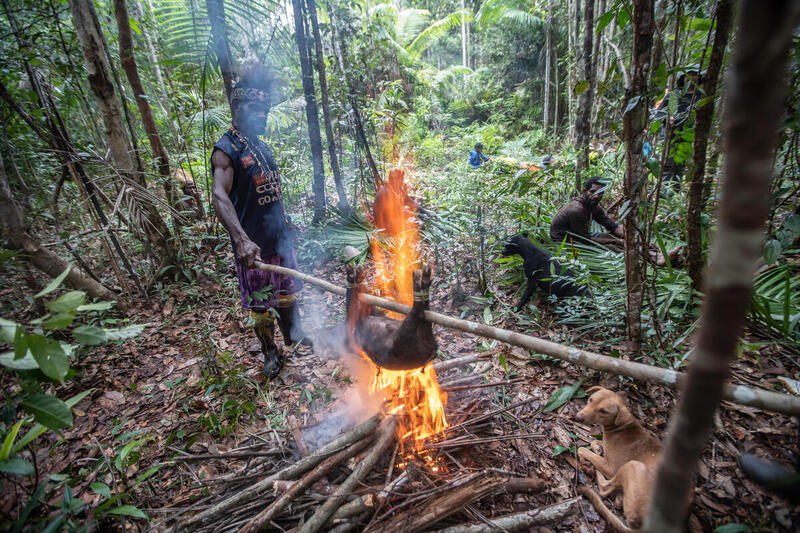
The Fight
Driven by a determination not to lose their forests to the plantation industry as is happening elsewhere in Papua, the Auyu people have taken their honourable fight against palm oil companies to court – in fact, to more than one court. On March 13, 2023, Franky Woro filed an environmental and land rights lawsuit at Jayapura Administrative Court, calling for the revocation of a government permit issued to Malaysian-owned palm oil company PT Indo Asiana Lestari.
Two months later, Franky gave evidence in support of six other Auyu environmental defenders who intervened in two cases filed by PT Megakarya Jaya Raya and PT Kartika Cipta Pratama in Jakarta administrative court. The two palm oil companies–whose concessions are located in the same landscape as PT IAL–are appealing a decision by the Minister of Environment and Forestry to revise the release of state forest area for plantation use.
With hearings taking place in distant Jayapura and Jakarta courts, these Auyu environmental fighters have steeled themselves to endure repeated long journeys away from their villages. Yes, undertaking the journey that I detailed at the beginning of this story.
For the Auyu, taking the defence of their customary forest into a cold courtroom that plays by unfriendly rules might be their only resort to protect their culture and future generations’ livelihoods. But eventually, winning this fight will also benefit us all. Being one of the largest and richest rainforests left in the world, the Papuan forest is our fortress to defend against the twin climate and biodiversity crises.
Therefore, for our own sake and for the sake of the planet, we must stand with the Auyu.
Budiarti Putri is the Communications Campaigner at Greenpeace Indonesia
